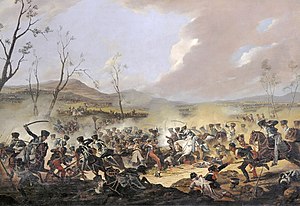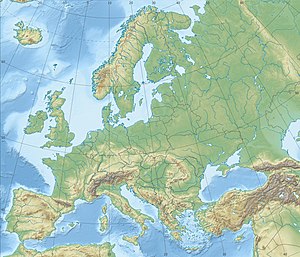
Back Schlacht bei Orthez German Batalla de Orthez Spanish Bataille d'Orthez (1814) French Battaglia di Orthez Italian Bitwa pod Orthez (1814) Polish Batalha de Orthez Portuguese Битва при Ортезе (1814) Russian
| Battle of Orthez | |||||||
|---|---|---|---|---|---|---|---|
| Part of the Peninsular War | |||||||
 The Final Charge of the British Cavalry at the Battle of Orthez, by Denis Dighton | |||||||
| |||||||
| Belligerents | |||||||
|
| |||||||
| Commanders and leaders | |||||||
|
|
| ||||||
| Strength | |||||||
|
34,993[1] 48 guns[2] |
44,000[3] 54 guns | ||||||
| Casualties and losses | |||||||
|
3,985 killed, wounded or captured[1] 6 guns lost | 2,174 killed, wounded or captured[3] | ||||||
Location within Europe | |||||||
The Battle of Orthez (27 February 1814) saw the Anglo-Spanish-Portuguese Army under Field Marshal Arthur Wellesley, Marquess of Wellington attack an Imperial French army led by Marshal Nicolas Soult in southern France. The outnumbered French repelled several Allied assaults on their right flank, but their center and left flank were overcome and Soult was compelled to retreat. At first the withdrawal was conducted in good order, but it eventually ended in a scramble for safety and many French soldiers became prisoners. The engagement occurred near the end of the Peninsular War.
In mid-February, Wellington's army broke out of its small area of conquered territory near Bayonne. Moving east, the Allies drove the French back from several river lines. After a pause in the campaign, the westernmost Allied corps surrounded and isolated Bayonne. Resuming their eastward drive, the remaining two Allied corps pushed Soult's army back to Orthez where the French marshal offered battle. In subsequent operations, Soult decided to abandon the large western port of Bordeaux and fall back east toward Toulouse. The next action was the Battle of Toulouse.
- ^ a b Smith 1998, pp. 500–01.
- ^ Gates 2002, p. 455.
- ^ a b Smith 1998, pp. 502–04.

